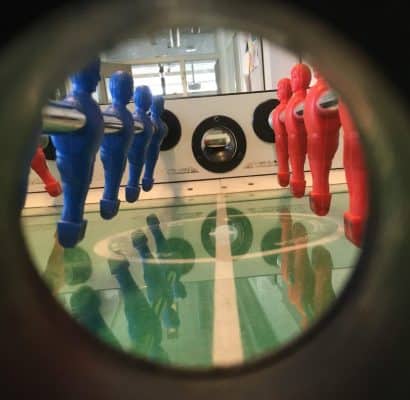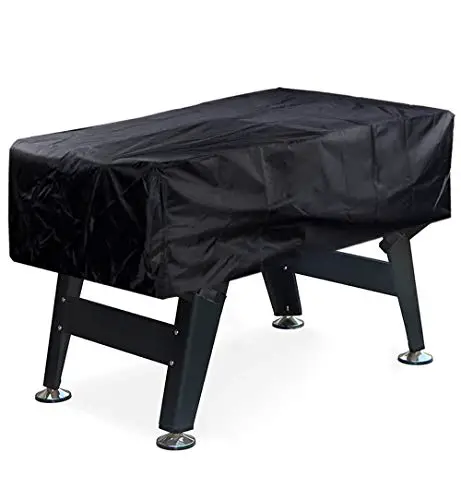Hey there! Are you tired of constantly losing in foosball, unable to defend against those sneaky shots? Don’t worry, we’ve got your back! In this blog post, we’re going to dive deep into the art of perfecting your defense in foosball. Whether you’re a newbie just starting out or a seasoned player looking to up your game, we’ve got some amazing tips and tricks that will turn you into an impenetrable wall. So get ready to defend like a pro and dominate the foosball table!
Master the game with these top-selling foosball technique books!
Understanding the Basics of Defense
In this section, we will cover the fundamental aspects of defense in foosball. You will learn about the different defensive positions, how to position your players effectively, and the importance of anticipation and reaction time.
Defensive Positions
When it comes to defense in foosball, understanding the different defensive positions is crucial. These positions refer to the arrangement of your players on the defensive side of the table. Here are the three main defensive positions:
- Goalie: The goalie is the player closest to the goal. Their primary role is to block shots and prevent the opponent from scoring. The goalie should have good reflexes and be skilled at making quick saves.
- Defensemen: The defensemen are positioned just in front of the goalie. They provide additional support for blocking shots and also help with transitioning the ball to the offensive side. It’s important for defensemen to be well-coordinated with the goalie and have good communication.
- Wings: The wings are players positioned on the sides of the defensive line. They help cover the wide areas of the table, preventing opponents from easily passing or shooting from the sides. Wings also play a crucial role in transitioning the ball to the offense.
Effective Player Positioning
Positioning your players effectively is key to a strong defense in foosball. Here are a few tips to help you position your players optimally:
- Spread your players: Distribute your defensive players evenly across the defensive line. This ensures that there are no gaps for the opponent to exploit.
- Keep a balanced formation: Maintain a balanced formation by positioning your players at equal distances from each other. This allows for quick movement and prevents the opponent from easily predicting your defensive strategy.
- Adapt to the opponent: Adjust your player positioning based on the opponent’s style of play. If they tend to shoot from the sides, emphasize the importance of wings. If they focus on strong shots towards the center, reinforce your goalie and defensemen.
Anticipation and Reaction Time
In foosball defense, anticipating your opponent’s moves and reacting quickly is essential. Here’s why anticipation and reaction time are crucial:
- Blocking shots: Anticipating where the opponent will shoot allows you to position your players effectively to block the shot. Quick reaction time ensures that you can move your players in the right direction in a split second.
- Intercepting passes: Anticipation helps you read the opponent’s passing patterns and intercept their passes. Reacting swiftly enables you to cut off passing lanes and regain ball possession.
- Countering offensive strategies: By anticipating the opponent’s offensive strategies, you can adjust your defensive positioning accordingly. Reacting promptly enables you to disrupt their plays and regain control of the game.
Mastering Defensive Techniques
Welcome back! In this section, we will take a deeper dive into specific defensive techniques that can significantly improve your game. Whether you’re a beginner or an experienced player, mastering these techniques will help you become a formidable force on the field. Let’s get started!
Blocking Shots: The Art of Defense
Defending your goal is crucial in any game, and learning how to effectively block shots can make all the difference. Here are some key points to keep in mind:
- Positioning: Proper positioning is key to blocking shots. Stand between the attacker and the goal, ensuring you have a clear line of sight.
- Anticipation: Watch the attacker’s movements and anticipate their shot. This will give you a split second advantage in blocking their attempt.
- Timing: Timing is crucial when it comes to blocking shots. Time your move to intercept the ball just as the attacker strikes it.
- Body Control: Use your body to block shots effectively. Extend your arms and legs to cover as much space as possible, making it harder for the attacker to find an opening.
- Communication: Coordinate with your teammates to ensure everyone is covering their assigned areas and aware of potential threats.
Utilizing Your Goalie: A Powerful Defensive Asset
Your goalie is your last line of defense, and utilizing them effectively can greatly enhance your team’s defensive capabilities. Consider the following:
- Communication: Establish clear communication channels with your goalie. This will help them anticipate your moves and provide better support.
- Positioning: The goalie should position themselves in the center of the goal, ready to react to any incoming shots.
- Shot Stopping: Train your goalie to have quick reflexes and the ability to make diving saves. This can be a game-changer in preventing goals.
- Distribution: A skilled goalie can launch accurate throws or kicks to initiate counter-attacks. This can catch the opposition off-guard and create scoring opportunities for your team.
Defending Against Different Offensive Strategies
Every team has its own offensive strategies, and understanding how to defend against them can give you a significant advantage. Let’s explore a few common offensive tactics and how to counter them:
- Man-to-Man Defense: Assign each defender to mark a specific attacker. Stick close to your assigned opponent and anticipate their moves to block their progress.
- Zone Defense: Position your defenders strategically to cover different areas of the field. This helps in minimizing passing lanes and forcing the opposition into making mistakes.
- Counter-Attacking: When the opposition commits too many players in the attack, exploit the spaces they leave behind. Quick, well-timed counter-attacks can catch them off-guard and lead to scoring opportunities.
Key Takeaways
To summarize the key points we’ve discussed:
- Proper positioning and anticipation are crucial for effective shot blocking.
- Utilize your goalie’s skills and communicate effectively to strengthen your defense.
- Adapt your defensive strategy to counter different offensive tactics.
Remember, mastering defensive techniques takes practice and teamwork. So get out there, hone your skills, and become a defensive powerhouse on the field!
Keep an eye out for more insightful articles in our blog. Until next time!
Developing Tactical Awareness
Foosball is not just about flicking the rods and hoping for the best. To excel in the game, you need to develop tactical awareness – the ability to read your opponents’ moves, anticipate their shots, and adjust your defensive strategy accordingly. In this blog post, we will explore the importance of tactical awareness and provide you with tips on how to develop this crucial skill.
Why is Tactical Awareness Important?
Tactical awareness is the key to success in foosball. It allows you to stay one step ahead of your opponents, making it easier to defend against their attacks and launch effective counter-attacks. Here are a few reasons why developing tactical awareness is crucial:
- Read Your Opponents: By observing your opponents’ playing style, you can anticipate their moves and react accordingly. This helps you to better analyze their strengths and weaknesses.
- Anticipate Shots: A strong tactical awareness allows you to predict the direction and power of your opponents’ shots. By doing so, you can position your defenders to block the shot effectively.
- Adjust Defensive Strategy: Tactical awareness enables you to adjust your defensive strategy on the fly. You can identify patterns in your opponents’ gameplay and adapt your defensive formations to counter their strategies.
How to Develop Tactical Awareness
Now that we understand the importance of tactical awareness, let’s dive into some practical tips to help you develop this skill:
1. Observe and Analyze
- Watch your opponents closely and study their playing style. Look for patterns, habits, and weaknesses that you can exploit.
- Pay attention to the position of their rods, the angle at which they strike the ball, and their preferred shooting techniques.
2. Play Mindfully
- Stay focused and fully present during the game. Avoid distractions and concentrate on the table, the ball, and your opponents’ moves.
- Anticipate the next move based on the current situation. Make mental notes of your opponents’ tendencies and adjust your defensive and offensive strategies accordingly.
3. Practice Regularly
- The more you play, the better your tactical awareness will become. Regular practice allows you to fine-tune your skills and develop a deeper understanding of the game.
- Practice with players of different skill levels to expose yourself to different playing styles and challenges. This will enhance your ability to adapt and react quickly during real matches.
4. Learn from the Pros
- Watch professional foosball matches and analyze the strategies employed by top players. Pay attention to their positioning, shot selection, and defensive techniques.
- Take notes and try to incorporate some of their tactics into your own gameplay. Experiment with different strategies to find what works best for you.
Practicing and Fine-tuning Your Defense
To become a formidable force in foosball, having a strong defense is crucial. It not only prevents your opponent from scoring but also sets you up for powerful counterattacks. In this blog section, we will provide practical tips and exercises to help you practice and refine your defensive skills. From solo practice drills to playing against different opponents, we will guide you on how to continuously improve your defense in foosball.
Solo Practice Drills
Mastering the defensive techniques on your own is a great way to build a strong foundation. Here are some solo practice drills to help you level up your defense:
- Wall Pass: Place the ball on your defensive rod and practice passing it back and forth between the wall and your defensive players. This drill helps improve your accuracy and control.
- Goalie Toss: Start by tossing the ball to yourself from the goalie rod and practice catching it with your defensive players. Focus on developing quick reflexes and precise ball control.
- Block and Clear: Position your defensive players in a line and practice blocking shots from your opponent’s offensive players. Then, quickly clear the ball to your offensive players to start a counterattack. This drill enhances your defensive positioning and transition skills.
Playing Against Different Opponents
While solo drills are essential, playing against different opponents is where you truly put your defensive skills to the test. Here are some strategies and tips to help you fine-tune your defense when facing different opponents:
- Observe and Adapt: Pay attention to your opponent’s playing style and adapt your defense accordingly. Some opponents may rely on fast shots, while others may focus on precision. Analyze their strengths and weaknesses to adjust your defensive positioning and anticipation.
- Pressure and Force Mistakes: Apply pressure on your opponent’s offensive players by closing down passing lanes and blocking shooting angles. By forcing mistakes, you increase your chances of gaining possession and launching counterattacks.
- Communication and Coordination: If you’re playing in a doubles match, effective communication and coordination with your partner are essential. Coordinate defensive switches, cover each other’s areas, and communicate about the opponent’s strategy. This teamwork will strengthen your defense and make it harder for your opponents to break through.
Key Points:
To summarize the main points covered in this blog section, here are some key takeaways:
- Solo practice drills such as wall pass, goalie toss, and block and clear can help you improve your defensive skills on your own.
- Playing against different opponents allows you to adapt your defense to their playing style, increasing your chances of success.
- Applying pressure, forcing mistakes, and effective communication are vital in fine-tuning your defense.
- Continuous practice and refinement of your defensive skills are essential to becoming a strong foosball player.
By incorporating these tips and strategies into your practice sessions and games, you will steadily improve your defense in foosball. Remember, practice makes perfect, so keep honing your skills, and soon you’ll be a defensive powerhouse on the foosball table!
Take your foosball game to the next level with these defensive strategies
In conclusion, by following the tips and techniques mentioned in this blog post, you can take your defense in foosball to the next level. Remember to focus on the fundamentals, hone your skills, stay alert to the game’s dynamics, and most importantly, practice regularly. With dedication and perseverance, you’ll see a significant improvement in your defensive abilities. So, don’t wait any longer – go out and have fun while perfecting your defense in foosball!







